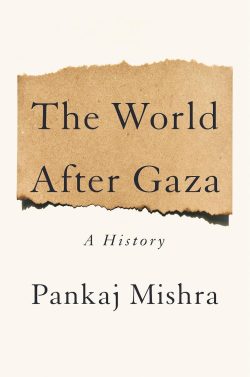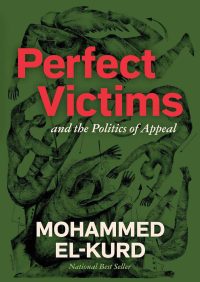Victimhood, Perfect and Otherwise
Pankaj Mishra’s The World After Gaza and Mohammed El-Kurd’s Perfect Victims
November 4, 2025


IT IS SOMETIMES EASY to forget that every historical genocide, not just the one we are witnessing today in Gaza, revolves around the existential fears and tales of victimhood of the perpetrators. Colonizers across time and space have managed to fuse narratives of past trauma (religious persecution, foreign domination, humiliating defeat) with the conqueror’s feelings of guilt and aggression toward the natives into powerful mixtures of self-justification, eschatology, and criminal sense of purpose.
Nevertheless, the place of the Holocaust in the discourses surrounding Israel’s genocide in Gaza deserves special attention. A long list of commentators has already pointed out how a ritualized and hollowed-out version of Holocaust remembrance has been made into a potent ideological weapon of the Right. Ironically, this includes the direct heirs of European fascism, who are living through their most significant comeback since 1945.
While the instrumentalization of the Holocaust has functions that supersede the defense of Israeli war crimes, Gaza epitomizes its power and contradictions. Pankaj Mishra and Mohammed El-Kurd’s recent books give connected and yet radically different answers to this challenge, the one by dissection, the other by rejection. Both are needed. However, El-Kurd’s response is the one that has been most violently repressed and most direly missing, as it challenges the very logic of this ideological contest of victimhoods as well as the power structure that it reveals.
Mishra’s The World After Gaza in fact deals more with modern Jewish history and the Holocaust than it does with the world. The celebrated commentator on European colonialism, Pan-Asianism, and the global far right carefully reconstructs the repurposing of the Holocaust by Israel in the service of building a hardened nationalist, exclusionary, and at times openly expulsionary state.
In the process, he gives voice to the many dissenters—Jewish dissenters featured prominently among them—who have fought for a different, universalist, antiracist, and anti-
colonial reading of the lessons of the Holocaust. One of the most important achievements of the book is that it helps to historically situate the travesty of the far right’s libidinal enthusiasm, not just for the idea of Israel in a general and abstract sense, but for “protecting the Jews against antisemitism” (here understood as any protest against what is happening in Gaza) and for ensuring the current Israeli regime can continue its slaughter of the Palestinians unabatedly.
Trump’s “Gazan Riviera” speech and subsequent financial warfare against the Ivy Leagues under the banner of fighting hate crimes made the contradictions so glaringly visible that even some of the most fervent Zionists started to move uncomfortably in their chairs. Mishra shows how the embrace of a story of Jewish victimhood by rabid racists and antisemites goes well beyond Trump’s entourage, or the West.
For this, he draws on his own youthful dalliances with Hindutva, carrying with it its own complicated mixture of Aryan pride and admiration for Israeli strongmen. In doing so, he manages to deepen and globalize our understanding of the ideological affinity between Zionism and neofascism and the authoritarian right today.
Against Mishra’s insistent but polite assault on Western sensitivities, El-Kurd places a note of defiant irreverence.
Early on in the book, Mishra notes his slowly growing awareness of how the power of the story of the Shoah, in its Zionist rendering, functioned to silence Palestinians, creating “an insidious Western regimen of repressions and prohibitions.”1Pankaj Mishra, The World After Gaza (London: Fern Press, 2025), 19. Ironically, his powerful and detailed takedown of the abuse of Jewish suffering in the midst of a genocide against Palestinians also reinforces the regime’s central plank.
Once again, one cannot talk about Palestine on the world stage unless it is through the lens of another people’s history. That is not to deny that there is an important place for that history in the current conjuncture.
But it is noteworthy that in the book of this powerful writer on colonialism and decolonization, Palestinian voices and the Palestinian struggle for self-determination have so little place, and that the book ends with the understandable but defeatist injunction that “Israel will most likely succeed in ethnic cleansing Gaza, and the West Bank as well.”2Mohammed El-Kurd, Perfect Victims and the Politics of Appeal (Chicago: Haymarket Books, 2025), 279. Does a non-Palestinian, even one with Mishra’s credentials and his obvious solidarity with the Palestinian cause, have the right to so easily write off hope, while those in Gaza are fighting for their survival?
Palestinian poet and advocate Mohammed El-Kurd’s Perfect Victims and the Politics of Appeal is the ultimate outcry against discussing Palestine in a way in which the Palestinian “is making a cameo in someone else’s story line.”3El-Kurd, Perfect Victims, 29. With a combination of cool precision and indignation that resembles the great anticolonial texts of the previous century (Frantz Fanon, Aimé Césaire, Albert Memmi), El-Kurd dissects the Palestinian condition as being “caught in a fever dream—trapped in someone else’s hallucination.”4El-Kurd, Perfect Victims, 121.
In this ghostly reality, Palestinians who are subjected to the violence of colonial settlers invading their very houses, as happened to El-Kurd’s family, to military occupation, apartheid, and AI-driven killings from the sky are not allowed to speak unless they prove to be the perfect victims. Their words, even those unuttered but merely suspected as lingering thoughts, are continuously taken to be worse offenses than their actual murder and subjugation.
The fate befalls all Palestinians without exception but particularly Palestinian men. Construed as terrorists and angry Arabs, they are hardly counted in a genocide that apparently kills women, children, and “fighters”—as if women and children in the face of their killers never pick up a gun, and as if men never die while cowering under the floorboards or scurrying for food. In a powerful act of emancipatory inversion, El-Kurd chooses to mostly denote Palestinians using “he,” “to force the reader to come face to face with the Palestinian man.”5El-Kurd, Perfect Victims, 5.
His book signals the refusal to read the ongoing Palestinian Nakba through the eyes of Jewish tragedy or trauma. It demands the right of the imperfect victim of genocide to be heard and rejects the perpetrators’ conjuring-up of fears as worthy of respect. Or, as El-Kurd puts it:
Language comparing Zionists to Nazis is scrutinized—even penalized—more than the government policies and military actions that beg for the analogy to be made. As long as this status quo persists, as long as Palestinians are subjected to colonial violence and erasure, we certainly can and should refuse indignity as a state of being, refuse to shrink ourselves and our aspirations, refuse to be silenced or shouted over, and refuse to assuage the hallucinations of our colonizers.6El-Kurd, Perfect Victims, 121-122.
Against Mishra’s insistent but polite assault on Western sensitivities, El-Kurd places a note of defiant irreverence. What other mode of writing can be asked of a Palestinian in conditions in which the enormous gap between cultivated victimhood and real power discrepancies are the space in which the world allows for genocide? ×
Notes & References
- Pankaj Mishra, The World After Gaza (London: Fern Press, 2025), 19.
- Mohammed El-Kurd, Perfect Victims and the Politics of Appeal (Chicago: Haymarket Books, 2025), 279.
- El-Kurd, Perfect Victims, 29.
- El-Kurd, Perfect Victims, 121.
- El-Kurd, Perfect Victims, 5.
- El-Kurd, Perfect Victims, 121–22.
